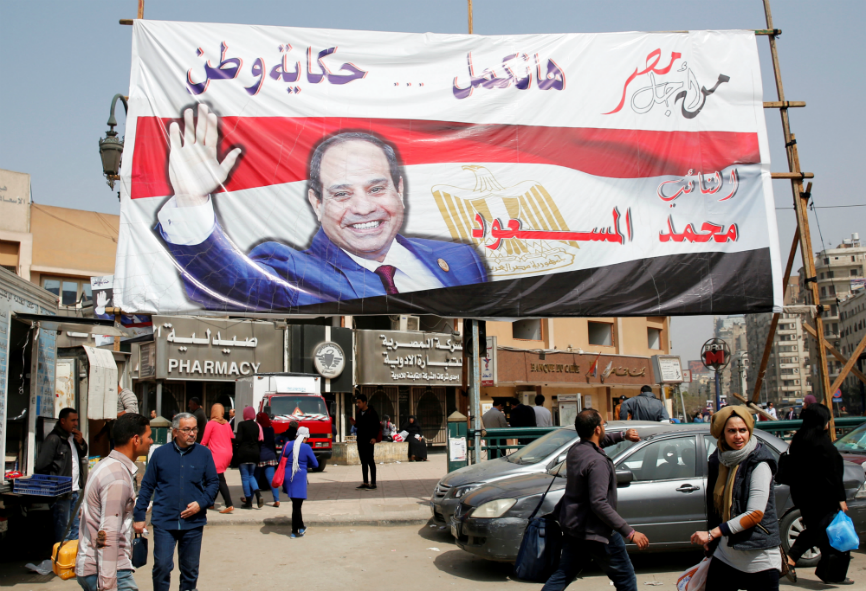Abdelfattah el Sisi faces little opposition in his reelection bid as voters head to the polls Monday through Wednesday. Thanks to the broadly solid support of the country's all-powerful military and a general yearning for stability, Sisi was able to move decisively to disqualify any other serious contenders. There are signs, however, that the sense of complacency with the president's strongman rule could start to fray in his second term.
Ahead of the vote, security services detained former prime minister Ahmed Shafiq and persuaded him to withdraw his candidacy. The army arrested former Sisi chief of staff Sami Anan when he made the surprise announcement he intended to run. Because of both figures' links to the military and former president Hosni Mubarak, they could have rallied the support of the disgruntled middle class, anti-Sisi military officers, and former members of the now-disbanded Muslim Brotherhood.
The regime also intensified its crackdown on all forms of opposition, for example arresting former presidential candidate and moderate Islamist Abdel Moneim Aboul Fotouh.
That has left the little-known Mussa Mustapha Mussa, Sisi's former campaign manager, as the only other name on the presidential ballot this week. Mussa registered to run only hours before the deadline and had even endorsed Sisi for reelection, leading some to dismiss him as a “dummy” candidate.
Still, these authoritarian methods have not prompted Egyptians to take to the streets, as they did in 2011 to put an end to 30 years of repressive rule under Mubarak. Many are still traumatized by the instability that followed, and Sisi has ably exploited their fears by constantly highlighting the threat posed by jihadism and chaos in neighboring Libya, as well as in Syria and Yemen. A program of harsh repression and a climate of paranoia have managed to demobilize protesters and opponents, who have very little room to organize.
Though many Egyptians remain wary of instability, they face increasingly difficult living conditions, which carry the potential to spark spontaneous outbreaks of unrest. The combination of accelerating inflation, low wages, and high unemployment mean that the president will have to tread cautiously in carrying out much-needed economic reforms.
In addition, there are signs of rifts beginning to form in the ranks of the military. Between October 2017 and February 2018, Sisi carried out a series of shuffles to ensure loyal and controllable appointees were in charge. The changes, as well as a series of damaging leaks to the international press likely planted by anti-Sisi officers, point to growing tensions. Though the president continues to enjoy the support of most high-ranking military officers, the risk is that a spike in instability could offer his enemies the opportunity to undermine or remove him.
Many neighboring countries have a stake in how these dynamics play out. Egypt is a major player in the Libya crisis, where its role is gradually evolving and becoming more constructive by encouraging talks; it is a key partner for Israel, by virtue of its mediating role between the main Palestinian factions; and it is also increasingly deeply embroiled in a delicate international dispute over water politics in the Nile Basin with Sudan and Ethiopia. The broader region will be watching closely what happens next in Egypt.

 People walk by a poster of Egyptian President Abdelfattah el Sisi for the upcoming election in Cairo, Egypt, on 1 March 2018. The poster reads: "Story of the country will continue with you." REUTERS/Amr Abdallah Dalsh
People walk by a poster of Egyptian President Abdelfattah el Sisi for the upcoming election in Cairo, Egypt, on 1 March 2018. The poster reads: "Story of the country will continue with you." REUTERS/Amr Abdallah Dalsh